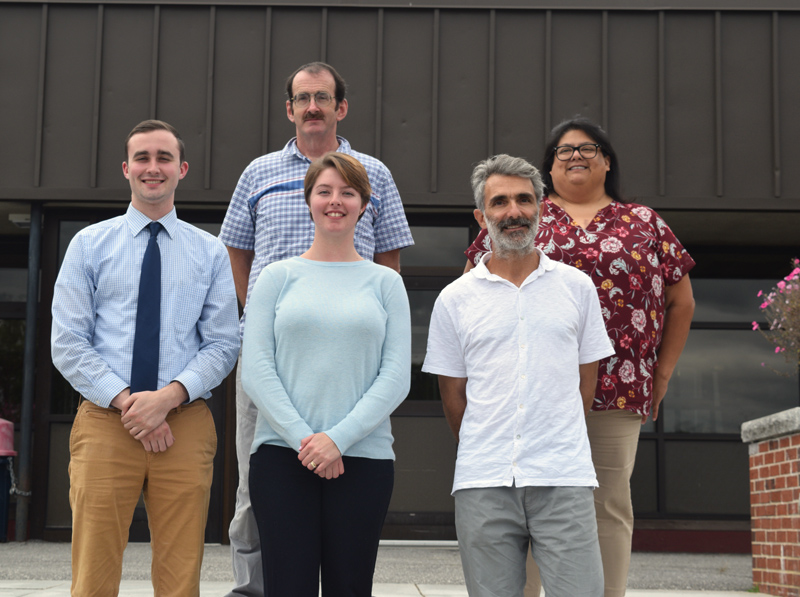
New educators at Wiscasset Middle High School. Front from left: Wyatt Ray, Maggie Burris, and Alain Ollier. Back: Gordon Clark and Adrienne Fraire. (Jessica Clifford photo)
A group of five new teachers with various backgrounds and levels of experience started work at Wiscasset Middle High School this year.
The new teachers are Maggie Burris, who teaches a variety of science and vocational classes; Gordon Clark, sixth grade educational technician III; Wyatt Ray, high school science; Alain Ollier, high school French and Spanish; and Adrienne Fraire, high school social studies.
“We are so fortunate to have the talent that’s at this table. We’ve got talent, raw talent, and it’s wonderful,” WMHS Principal Charles Lomonte said of the new staff members. “I’m so excited to have all of them with us.”
Burris, of Whitefield, will teach the middle school career and technical education program, an introduction to the vocational studies available at the Bath Regional Career and Technical Center.
“I do a couple weeks in each little section because it’s only a semester long for each grade,” Burris said of how she covers vocational topics in her class.
She will also teach science, technology, engineering, and mathematics, or STEM, courses, as well as financial math.
“We’ve home-grown Maggie,” Lomonte said, because Burris was a student teacher and substitute teacher in Wiscasset.
This is Burris’ first year as a full-time teacher. She graduated in December from the University of Maine at Orono.
Clark, of Damariscotta, has five years of experience teaching, in the Peace Corps, as a substitute, and as a high school math teacher.
While in the Peace Corps, Clark taught math and science. He has a master’s degree from Teachers College at Columbia University. He attended Wiscasset Elementary School as a child.
Clark said in his new position he will be “with the sixth graders all day in all of their core subjects – English, math, science, (and) social studies.” So far, Clark enjoys teaching one grade the entire day.
Ray, of Hallowell, will teach a variety of science classes, including biology, honors biology, introduction to engineering, and forensics.
Ray graduated from the University of Maine at Machias with a degree in biology and a minor in secondary education. He is working on his master’s degree at the University of Maine at Orono.
He has two years of experience teaching. Before coming to WMHS, he taught the entire science department at Jonesport-Beals High School, a small school Down East.
Ollier, of Newcastle, said he has a background as a French-trained physical therapist. Before coming to WMHS, he was a long-term substitute in schools in Gardiner and Rockland. He has five years of teaching experience.
Ollier is originally from Brittany, France, and went to Paris for college. He learned Spanish through his schooling and traveling in South America.
Fraire, of Bath, teaches juniors and seniors various social studies classes, such as principles of democracy, U.S. history, and Advanced Placement U.S. history.
She is a veteran teacher from Southern California. This will be her 19th year teaching.
Fraire received her bachelor’s degree in history and political science from the University of California, Riverside, and has two master’s degrees in education.
Being from the other side of the U.S., Fraire is excited to learn the culture of her students in Maine. She said it is “reinvigorating” teaching here and has given her a spark to teach again.
“For me, I’m kind of doing a social experiment. I know Southern Californian kids so well, I was able to have stories that related to their lives and this is a totally different culture,” Fraire said. “I’m having to sharpen my skills and figure (the students) out.”
The teachers talked about some of their ideas to engage students.
Burris is looking forward to teaching students how to cook in her vocational class.
“For culinary, we are going to make a meal for the teachers of the school. We are also going to make butter and bring it over to the food pantry,” she said.
In carpentry, her students are going to build birdhouses, and potentially bring them to a local retirement home.
Although as an educational technician Clark does not have as much say in developing projects, he said he hopes to “have a chance to bring more real-world experiences and applications” into his classes.
As part of introduction to engineering, Ray said students in the semester-long class will work in pairs or groups of three to design an object or software that helps society in some way.
“Right now we are working on brainstorming the ideas … and moving towards drafting blueprint-style engineer drawings,” Ray said. Students will eventually use a 3D printer to create an object.
One idea Ollier has for a French project is to have students correspond with a class in France, because he has connection to schools overseas.
“It’s just a seed right now,” Ollier said of the idea.



